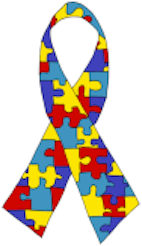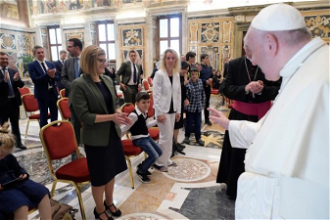Autism Guidelines for Parishes

Autism Awareness Ribbon - Wiki Image
Deacon Mark Paine writes:
I am a permanent deacon of the Archdiocese of Birmingham and I was diagnosed with Autism in my late 40s, following the diagnosis of both my children. My career has been in primary education with over a decade as a Special Educational Needs Coordinator in two different schools as well as teaching in a school for pupils with Severe Learning Difficulties.
The following are a set of proposed guidelines for Catholic parishes in our Archdiocese. They are written specifically with regard to people with Autism and related conditions. However, making parishes more 'welcoming' of difference will benefit all parishioners, regardless of whether they are disabled or not, and will enhance the missionary activity of The Church.
For us Catholics, the parish is at the centre of our spiritual lives, a place of mission, fellowship and ecclesial communion. The more welcoming it can be made for everyone, the more it realises its potential.
The Catechism of The Catholic Church on the universal dignity of the human person:
"Christ, . . . in the very revelation of the mystery of the Father and of his love,makes man fully manifest to himself and brings to light his exalted vocation." It is in Christ, "the image of the invisible God" that man has been created "in the image and likeness" of the Creator. It is in Christ, Redeemer and Saviour, that the divine image, disfigured in man by the first sin, has been restored to its original beauty and ennobled by the grace of God.
1702 The divine image is present in every man. It shines forth in the communion ofpersons, in the likeness of the union of the divine persons among themselves.
1929 Social justice can be obtained only in respecting the transcendent dignity of man. the person represents the ultimate end of society, which is ordered to him:
What is at stake is the dignity of the human person, whose defence and promotion have been entrusted to us by the Creator, and to whom the men and women at every moment of history are strictly and responsibly in debt.
1930 Respect for the human person entails respect for the rights that flow from his dignity as a creature. These rights are prior to society and must be recognized by it.
They are the basis of the moral legitimacy of every authority: by flouting them, or refusing to recognize them in its positive legislation, a society undermines its own moral legitimacy. If it does not respect them, authority can rely only on force or violence to obtain obedience from its subjects. It is the Church's role to remind men of good will of these rights and to distinguish them from unwarranted or false claims.
1931 Respect for the human person proceeds by way of respect for the principle that "everyone should look upon his neighbour (without any exception) as 'another self' above all bearing in mind his life and the means necessary for living it with dignity." No legislation could by itself do away with the fears, prejudices, and attitudes of pride and selfishness which obstruct the establishment of truly fraternal societies. Such behaviour will cease only through the charity that finds in every man a "neighbour," a brother.
1932 The duty of making oneself a neighbour to others and actively serving them becomes even more urgent when it involves the disadvantaged, in whatever area this may be. "As you did it to one of the least of these my brethren, you did it to me."
What is Autism?
Autism is a neurological difference and contrary to various discredited theories, it is present from birth and cannot be 'cured'. It manifests itself in many different ways but it can be broadly summarised as having the following effects:
Sensory - this can be extreme sensitivity to noise, light, taste, smell or touch; many Autistic people find loud noises distressing, others will really dislike physical contact or conversely derive comfort from certain fabrics or objects.
Social interaction - Autistic people often struggle in social situations for a variety of reasons. We cannot naturally understand or process the unwritten rules of social interaction that come instinctively to neurotypical people. This can cause embarrassment and upset. Autistic people can behave inappropriately or even appear rude due to not understanding the 'rules' pertaining to a situation. Large, informal gatherings can be like walking through a minefield blindfolded for an Autistic person. Often, Autistic people will avoid social occasions as they find them so difficult. All Autistic people will find socialising exhausting as they have to actively concentrate on things that neurotypical people do automatically.
Physical - some (but not all) Autistic people have issues with making eye contact. Their voices are often too loud or otherwise inappropriate in a particular situation. Stimming, a stress-relieving physical or verbal action, is frequently carried out by Autistic people (this could be a hand movement, a gesture, a noise).
Rigidity of thinking - Autistic people like processes, the predictable and the logical. The unexpected causes confusion and in extreme cases, changes to routine cause 'meltdowns' (an emotional short-circuit). Autistic people like to completely understand things and will question and challenge anything that does not make sense to them. Any changes to the norm need to be flagged as soon as possible in advance.
What Autism is not:
Lack of emotion - Autism is not the same as sociopathy or psychopathy; we have emotions even if they manifest in a non-typical way. Autistic people are not all like Mr Spock - some of us are extremely emotional and sensitive to the emotions of others, whilst others may appear distant and aloof.
'Rainman' - the vast majority of Autistic people are not Autistic Savants.
Caused by vaccinations, poor early parenting, a traumatic experience…
What can parishes do?
1. Most importantly - Ask us what may help us. Is there a means by which parishioners can make their particular needs known? If not, why not?
2. Is there someone there to greet parishioners, provide them with a Mass sheet, hymn book etc? Think about how someone new to the parish would find it navigating the building or understanding what was going on. A brief introductory leaflet, with photographs of key people, a building layout and basic information, would be a great help.
3. Place the information in 2 above on the parish website.
4. Consider noise and light levels - if possible, provide an alternative place or activity if there are going to be loud noises, bright lights etc. Avoid the use of fluorescent bulbs, as they can appear to flicker to Autistic people. In addition, avoid bright spotlights, particularly without warning.
5. Think about smell - if you are using incense, let people know so that they can decide where they are going to sit.
6. Is the Mass sheet clear about what to do, what to say and when to do it? Could a simple card or sheet with the basics of the Mass explained help?
7. Allow people to make a verbal 'Sign of Peace'.
8. If you using Holy Water, let people know in advance and explain what you are going to do. A great opportunity to explain symbols and why they matter to us Catholics.
9. If someone is standing on the fringes of a parish social, engage with them. They may choose not to engage back but this should not be perceived as rudeness. Do not push people into socialising. Body language is important - avoid forming tight circles or groups; physically open out to include everyone even if they choose to remain silent.
10. Say what you mean and mean what you say. We are often very literal and sarcasm can go over our heads. Consider the clarity of sermons - nuance and metaphor are great but some Autistic people will struggle to understand them.
11. We take everything in, all at once, in what can be a sensory and mental overload. Avoid 'too much', be it liturgical, verbal, physical, auditory. An Autistic person can literally not know where to look, what to listen to or what to do if there is a lot going on.
12. Have someone in the parish who understands the needs of Autistic people and who can provide support as needed e.g. watching out for signs of distress.
13. Look at parish social events and consider how some, if possible, could be made Autism friendly.
14. Model acceptance of difference - if someone is being loud or stimming or in any way 'inappropriate', do not tut, stare or invite the person/family to leave. Ignore the behaviour at the time and then make sure that the person/their family does not leave the building feeling unwelcome. This happens all of the time.
15. Ensure that parish committees, groups etc represent the full spectrum of parishioners - Catholic young people and adults with disabilities have to be part of the decision making and /or consultation process. If disabled people are not represent, ask yourself why and do whatever is required to rectify the situation.
The above is not exhaustive and individual parishes will need to modify the recommendations to suit their circumstances.
Reflections
You made me welcome - Making our churches fully inclusive for people with Autism (and as a result, for everyone else)
'People with disabilities are like everybody else. Each person is unique and important, Each one has been created by God and for God. Each has a vulnerable heart and yearns to love and be loved and valued. Each one has a mission. Each of us is born so that God's work may be accomplished in us.' (L'Arche Community).
'In Christ's name, the Church is committed to making herself more and more a 'welcoming home' for you. We know that the disabled person - a unique and unrepeatable person in his equal and inviolable dignity - needs not only care, but first of all love which becomes recognition, respect and integration: from birth to adolescence, to adulthood and to the delicate moment, faced with trepidation by so many parents, of separation from their children, the moment of 'after us'.
Dear friends, we would like to feel that we share in your efforts and in the inevitable moments of discouragement, in order to brighten them with the light of faith and the hope of solidarity and love.'(Homily of Pope St John Paul II, 3 December 3 2000).
'Before I formed you in the womb I knew you; before you came to birth I consecrated you'. (Jeremiah 1, 5)


















